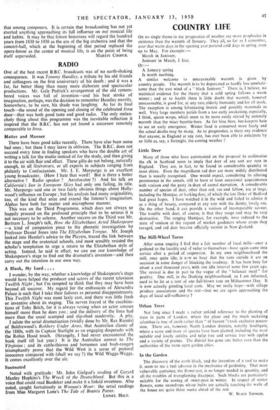Matter and Manner There have been good talks recently. There
have also been some bad ones ; but these I may leave in oblivion. The B.B.C. does not succeed every time in finding speakers who have the double art of writing a talk for the studio instead of for the study, and then giving it to the air with flair and effect. These gifts do not belong, naturally enough, to all litterateurs, or all experts in subjects ranging from philately to Confucianism. Mr. J. E. Morpurgo is an excellent young broadcaster. (How I hate that word! But is there a better alternative ? Radio speaker ? Aerolocutor ?) And his talk on California's Sun in European Skies had only one failing, its title. Mr. Morpurgo said one or two fairly obvious things about Holly- wood's influence on Europe ; but his analysis had many originalities, too, of the kind that seize and extend the listener's imagination. Alphas here both for matter and microphone manner.
This was on the Third Programme, which does not always so happily proceed on the profound principle that to be serious it is not necessary to be solemn. Another success on the Third was Mr. Bertram L. Joseph's talk, How the Elizabethans Acted Shakespeare —a kind of companion piece to the phonetic investigation by Professor Daniel Jones into The Elizabethan Tongue. Mr. Joseph looked into Hamlet's advice to the Players, traced the link between the stage and the oratorical schools, and most sensibly resisted the• scholar's temptation to urge a return to the Elizabethan style of acting. Instead, he said in effect, we can use our knowledge of Shakespeare's stage to find out the dramatist's invention—and then carry out the intention in our own way.






























 Previous page
Previous page